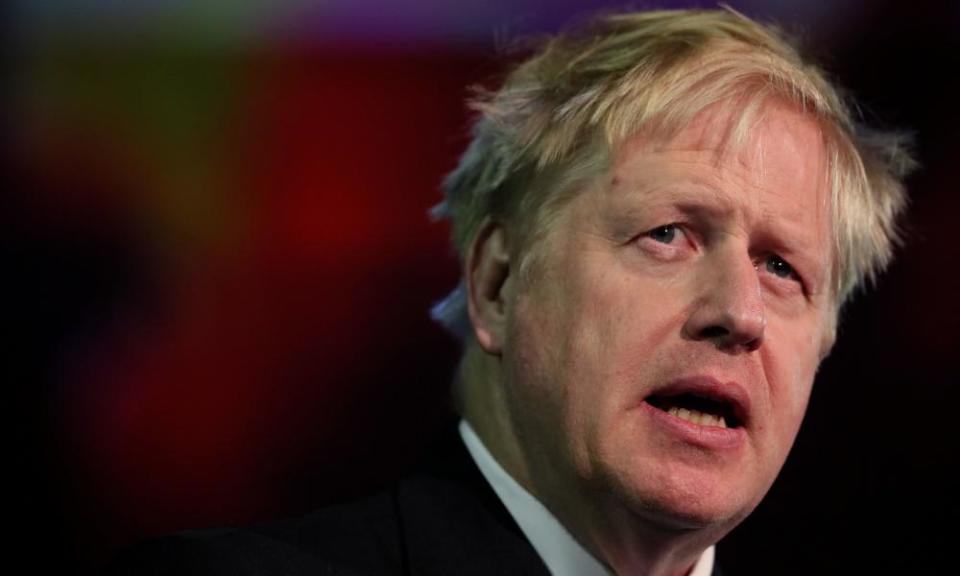Why the threat of an early election makes Tories double down on Boris Johnson

Will Britain’s next prime minister have one of the shortest premierships in recent history? Theresa May’s successor is yet to be selected but already talk has turned to whether an early election is imminent. With Boris Johnson the clear favourite for the job, his pledge to take the UK out of the EU by the end of October – deal or no deal – has led a number of Tory MPs to predict that a snap election will soon follow his arrival in 10 Downing Street.
Johnson’s closest rival, Jeremy Hunt – who came second in the first ballot – has accused him of “effectively committing the country to no deal … or an election”. Although the former mayor of London has said he plans to negotiate a Brexit deal, there is scepticism that a) Brussels would be willing to cede to his demands, and b) there would be time for such a renegotiation to take place before the end of the article 50 extension on 31 October.
While a hard Brexit deadline risks an unwelcome trip to the polling booth, a Brexit delay could prove fatal to the party
Should no new deal materialise, Johnson has said he would take the UK out of the EU without a deal. This is something parliament would likely try to stop – potentially triggering a general election in the process. Campaign rivals have taken to jesting that they’ll “meet again in November” for a second leadership contest after the new government collapses.
Johnson allies dismiss such ideas, suggesting parliament can’t actually stop a no-deal Brexit. However, pro-EU MPs point to John Bercow – who they describe as an “activist speaker” – as the great hope for finding a way to block no deal. Even if Bercow fails to rise to the occasion, there could be enough Tory MPs willing to take the drastic option of voting down their own government to prevent no deal. Ken Clarke has said that if push came to shove he would do so, while the work and pensions secretary, Amber Rudd, used an interview over the weekend to say that she knew of other colleagues prepared to follow suit – insisting the numbers were there if MPs were pushed.
Why then are so many Conservative MPs still willing to take a punt on Johnson’s Brexit strategy over that of a candidate like Hunt? The former foreign secretary won 114 votes in the first parliamentary party ballot, while Hunt managed 43. The Tory leadership candidates can be divided into two categories – those willing to delay Brexit (like Hunt) and those willing to risk a host of undesirable outcomes to deliver Brexit on time (like Johnson). At the moment, the latter option is winning.
It’s not that Tory MPs have suddenly warmed to the idea of an early general election – the bulk are terrified by the prospect. They just feel that these days there are few good choices. While a hard Brexit deadline risks the chance of an unwelcome trip to the polling booth, an indefinite Brexit delay could prove fatal to the party in the long term. Unless Brussels offers concessions, all Brexit choices come with flaws.
For many MPs, the balance of risk has changed. The success of Nigel Farage’s Brexit party means that delaying Brexit again is seen as destructive to the Tory party. Johnson told MPs at the One Nation caucus hustings this month: “We are facing an existential crisis and will not be forgiven if we do not deliver Brexit on 31 October.”
As one cabinet minister put it to me: “To delay would be death by a thousand cuts. A general election on a clear Brexit platform is not the worst option.” There’s a sense that any further delay to Brexit could isolate the Tory grassroots and do irreparable damage. Some Tory MPs believe a Prime Minister Johnson could even call an election himself in the event that parliament found a way to thwart no deal, and he found himself unable to fulfil his promises. “The thing Tory MPs fear is that Boris Johnson calls a general election when no deal is blocked. In order to deliver it, he has to change the composition of the Commons and that means a general election,” one sceptical MP says.
Related: Then there were six: policies of remaining Tory contenders
The hope is that by having a new leader in No 10, the entire mood music will change. Brussels will look to a Brexiteer prime minister and see someone who won’t blink as Theresa May did over a no-deal Brexit. They will see in Johnson someone determined to deliver it and that, his supporters say, ought to lead to Brussels starting to renegotiate. One concession on the Irish backstop and a Brexit deal could pass.
But if that plan fails, many MPs still believe having Johnson at the helm is the best option. Speak to Johnson’s supporters and they repeatedly point to what they see as his electability. They believe that the party is in dire straits and he is the man best positioned to take on both Farage and Jeremy Corbyn in a general election – whether that’s in three months or three years.
The crux of the matter: no one in the Tory party is sure how Johnson’s Brexit gamble would play out. However, faced with only difficult decisions on Brexit, a growing number believe that come rain or shine Johnson is the person they want leading from the front.
• Katy Balls is the Spectator’s deputy political editor

 Yahoo News
Yahoo News 